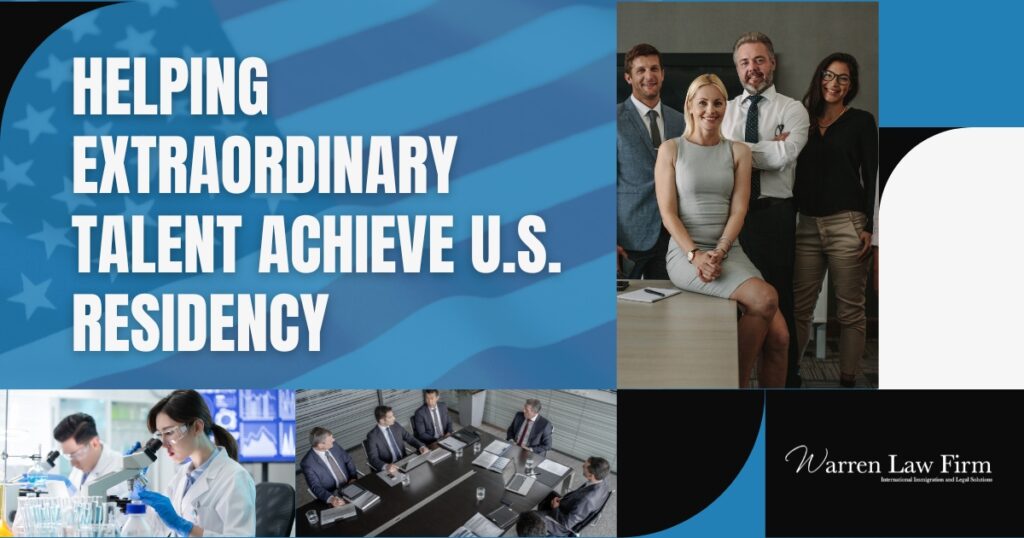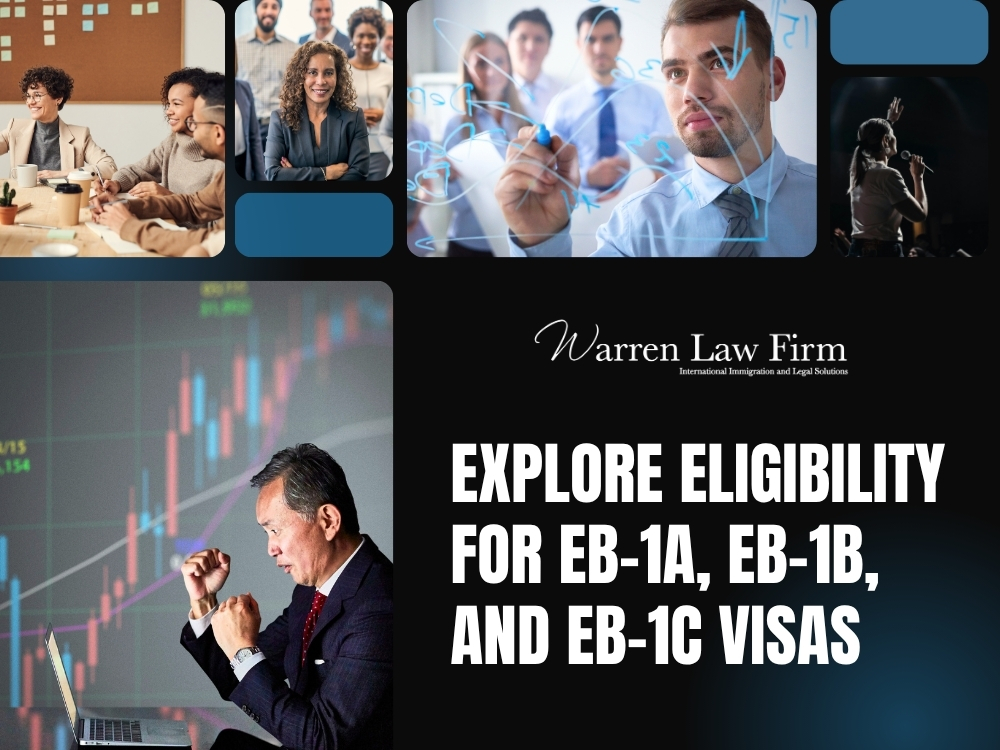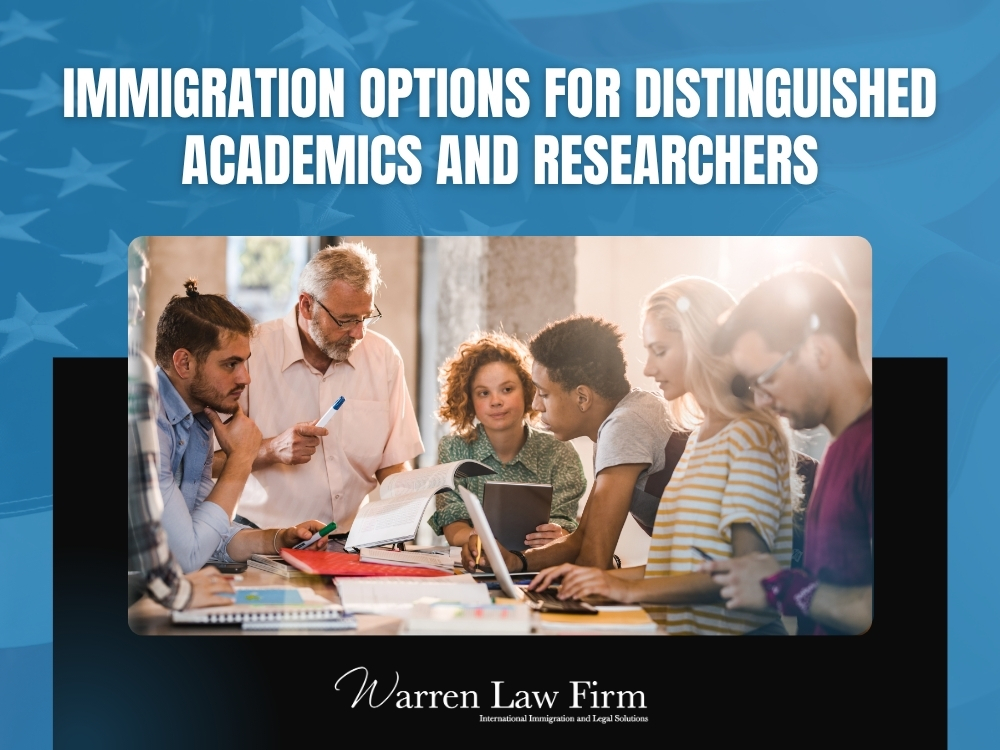EB-1 Visa Lawyer
Home » Work Visas and Employment Green Cards » EB-1 Visa Lawyer

An EB-1 visa is an employment-based immigrant visa that allows foreign nationals with extraordinary abilities and achievements to live and work in the United States permanently. The EB-1 visa is for workers who are considered “First Preference” workers. This type of visa is reserved only for elite immigrants who can prove their excellence, extraordinary ability, or outstanding achievements in their fields.
Foreign nationals pursuing the EB-1 visa should be aware that the U.S. Citizenship and Immigration Services (USCIS) applies rigorous review standards to all petitions. Applicants who wish to qualify under the EB-1 criteria must demonstrate extraordinary ability through verifiable evidence of sustained national or international recognition.
While these requirements are demanding, they allow successful applicants to enjoy several benefits, including faster processing and exemption from the labor certification process.
Other employment-based immigrant visas require a National Interest Waiver (NIW) to circumvent the labor certification process. But the extraordinary requirements for the EB-1 visa means that there is no EB-1 NIW. Applicants are exempt from labor certification.
You may be eligible for an EB-1 visa if you can prove that you fit into one of these three EB-1 occupational subcategories:
- A noncitizen of extraordinary ability
- An outstanding professor or researcher
- A multinational executive or manager
This guide will explain the differences between the occupational subcategories of EB-1 visas, discuss the steps for applying for an EB-1 visa, and tackle some of the frequently asked questions about EB-1 visas.
Table of Contents
Request A Consultation
Meet The Attorney
Angela D. Warren
With more than 20 years of immigration and business immigration experience, Angela Warren has helped hundreds of individuals, families and businesses.
Get The Immigration Help You Deserve
EB-1 Visa Guide
The EB-1 visa has three occupational subcategories: EB-1A, EB-1B, and EB-1C. Each occupational subcategory has certain eligibility requirements that must be met and certain evidence that must be submitted with the petition. No labor certificate is needed to petition for an EB-1 visa in any of these subcategories.

EB-1A Criteria: Immigrant Visa for Extraordinary Ability
The EB-1A criteria for qualification including being aa foreign national who can show that you have extraordinary ability in either the sciences, the arts, education, business, or athletics. You will need to show proof that you have sustained national or international recognition for your extraordinary ability.
To prove this, you will either have to show USCIS proof of either one major internationally recognized award (like a Pulitzer Prize or an Oscar), or you will have to show proof of three less renowned major awards or accomplishments.
Some examples provided by USCIS as acceptable evidence of extraordinary ability and achievement include:
- Winning a national or international award for excellence
- Being featured in a major trade publication or a major media outlet
- Being asked to judge the work of others in your field
- Original scientific, scholarly, artistic, or business–related contributions of major significance
- Documentation that you are paid significantly higher than others in your field because of your extraordinary talent
- Commercial success in the performing arts
- Having an important position in a distinguished organization
This is an elite immigrant visa reserved for very distinguished immigrants with extraordinary talent. If you are an EB-1A visa applicant, you don’t need to have an offer of employment from anyone, nor do you need a sponsor at all. If you are an EB-1A visa applicant, you can file a Form I-140, Petition for an Alien Worker, on your own behalf.
When preparing an EB-1A petition, precision in documentation is essential. USCIS officers evaluate not just the quality but also the relevance of evidence. Applicants should provide comprehensive explanations that connect each exhibit, such as publications, awards, or media coverage, to their extraordinary ability that meets the EB-1A criteria.
Demonstrating the lasting impact of one’s contributions, rather than simply listing accomplishments, often strengthens the petition.
Get The Immigration Help You Deserve
EB-1B Immigrant Visa for Outstanding Professors and Researchers
To qualify for an EB-1B visa, you must be able to show that you are an outstanding professor or researcher. To prove this, you must show USCIS that you have been internationally recognized in your academic field. You must have at least three years of teaching experience in your field or three years of research experience in your field.

You will need at least two pieces of evidence documenting your outstanding work. Some examples of proof you can submit that USCIS will consider include:
- Receiving a major prize or award for outstanding achievement
- Membership in an elite association related to your field
- Having a professional publication in your field, write about your work
- Original scientific or scholarly contributions in your field
- Having written a scholarly book or articles in scholarly journals with international circulation pertaining to your field
If you are applying for an EB-1B visa, you also need to show USCIS that you have a job offer from a U.S. employer. Plus, your future employer must prove that they have documented accomplishments themselves and that they employ at least three full-time researchers. This subcategory of EB-1 visas requires an employer to act as a sponsor and submit a petition on the employee’s behalf. The form the employer must file is Form I-140, Petition for Alien Worker.
EB-1C Visa Requirements for Multinational Managers or Executives
Multinational managers or executives can qualify for an EB-1C visa if they meet some requirements. For applicants pursuing an EB-1C visa, establishing a clear connection between the overseas employer and the U.S. entity is crucial. USCIS requires proof of a qualifying corporate relationship, such as a parent, subsidiary, or affiliate structure.
Applicants should also provide organizational charts, payroll records, and detailed job descriptions that highlight managerial authority and decision-making power. Understanding these EB-1C visa requirements from the outset can prevent delays and reduce the risk of a Request for Evidence (RFE).
For this visa, you must,
- Prove that you were employed as a manager or executive for at least one full year during the preceding three-year period by an overseas company affiliated with the U.S. employer.
- Show that your job offer in the United States is to be a manager or executive.
This subcategory of EB-1 visas requires the employer to act as a petitioning sponsor and must file the Form I-140, Petition for Alien Worker.
Applying for an EB-1 Visa
To apply for an EB-1 visa, a Form I-140, Petition for Alien Worker, must be submitted to the U.S. Citizenship and Immigration Services. Typically, Form I-140 is filed by the employer, but as noted above, a foreign national of extraordinary accomplishment can file their own Form I-140. That may seem simple enough. After all, Form I-140 is only nine pages long. However, it’s always best to seek guidance from an experienced immigration lawyer before petitioning for any visa, even an EB-1 visa.
There are several reasons to have an attorney help you prepare and file Form I-140, including the following:
- Along with the petition, the petitioner must submit an enormous amount of evidence to support the petition. Besides just initial evidence and evidence of achievements, supplemental forms may need to be filed.
- Denials of EB-1 visas can occur over inconsistent, incorrect, or missing information. Simple mistakes on a petition are grounds for denial.
- Even an EB-1A visa can get denied over a decades-old criminal conviction. Sometimes, even a lack of vaccination records can throw a wrench in the EB-1 visa approval process. A skilled attorney will know how and when to apply for a Waiver of Inadmissibility for most Grounds of Inadmissibility that might be lurking in the immigrant’s past.
- Forms are constantly changing, and so are fees. Filing a petition with an outdated form or the wrong filing fee can mess up the petition process. Experienced immigration attorneys are used to the unexpected and will greatly increase the chance of your EB-1 visa approval.
Get The Immigration Help You Deserve
EB-1 Visas: Frequently Asked Questions
Does an EB-1 visa grant you a green card?
No, but an EB-1 visa is an immigrant visa, which means that once the immigrant is in the United States, provided they meet other requirements, they can immediately apply for a green card. Someone in the country on an EB-1 visa can file Form I-485, Application to Register Permanent Residence or Adjust Status.
Can my Form I-140 be expedited?
While you can pay for Premium Processing and file Form I-907, Request for Premium Processing Service, there might be situations where your lawyer might not recommend it.
If I’m approved for an EB-1 visa, can my family come with me to the United States?
If your petition is approved by USCIS, your spouse and your unmarried children who are under the age of 21 may be eligible to apply for visas as derivative applicants.
Let an Experienced Immigration Attorney Help You Get an EB-1 Visa
The EB-1 visa category offers exceptional opportunities but also presents complex legal challenges. Applicants who work with an experienced immigration attorney from the beginning are better equipped to present persuasive petitions and avoid common pitfalls. A qualified lawyer will not only organize your documentation but also tailor your case strategy to align with current USCIS trends and precedents. This proactive approach can make a significant difference in achieving a successful outcome.
Warren Law Firm in San Francisco has over 20 years of experience in immigration and business immigration law. We will fight for you to achieve your immigration dreams and treat you with dignity and respect throughout the process.
If you believe you qualify under the EB-1A criteria, EB-1B category, or EB-1C visa requirements, schedule a consultation with Warren Law Firm. Our attorneys can assess your credentials, recommend the most effective immigration pathway, and help you move closer to obtaining lawful permanent residence in the United States.
